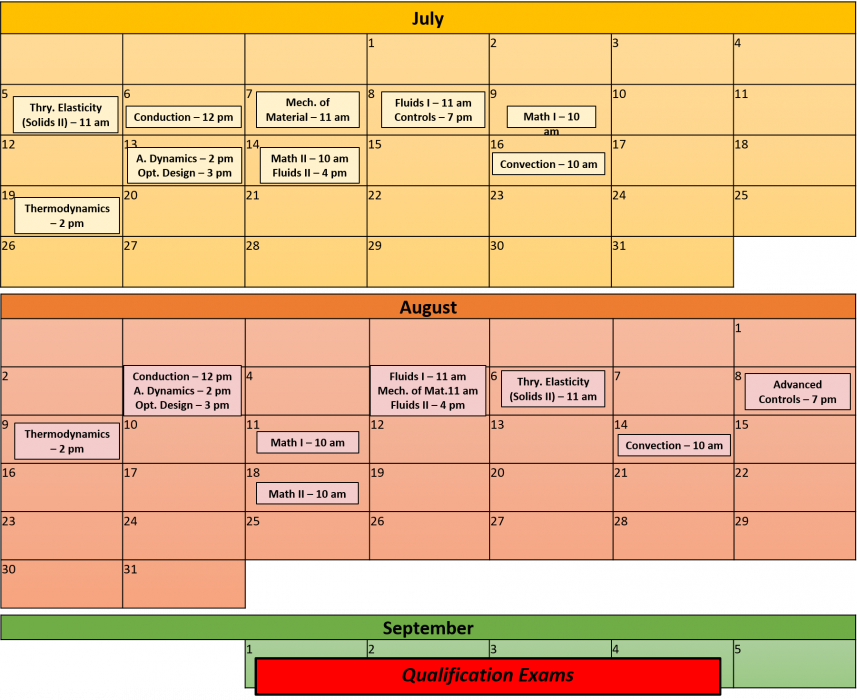Results of the Graduate Student Survey (Spring 2019)
We have gathered 49 responses to our graduate student survey, and we have also spoken with some students about the exam.
From the graduate student survey, we were able to make a few conclusions, and the first is the dichotomy of students. Separate conclusions are made for students who took the exam recently and older graduate students. Graduate students who came to Rutgers over 3 years ago agree with the current system, claiming that they remembered the material that they studied, which went beyond the scope of the courses they were enrolled in.
On the other hand, 84% students who came in the past 3 years seemed to agree that they wanted the current system to be changed, with 70% of students wanting to opt-out of the written exam by getting good grades in the courses, and 54% of students thought that the current examination system is a poor indicator of weather a student is qualified to be a PhD student.
Many students who took the survey brought up an interesting point, that the area of specialization (Fluids, Design and Control, Solid Mechanics, Thermal Processes) should not necessarily direct the areas which they wish to be tested on in the qualifying exam. On the same topic, a significant proportion, 46% of students, think that the diversity requirement of taking at least one class from each area of specialization is not important for PhD students, and can result in taking classes that are not relevant for them.
In terms of an oral exam, 84% the respondents to the survey were not in favor of an oral exam, either preferring a written exam or thinking that a written exam is just a better indicator for qualification. When commenting about the survey, some respondents noted that an oral exam may be harder, and would certainly be more subjective which may make an oral exam more unfair.
Some students voiced their opinion directly, asking for resources to be distributed fairly and to all students, like past exams from multiple years prior that they didn't have access to. It makes sense that all students should be provided the resources that a significant number of students have access to, so some example exams are attached below.
Other students struggle to justify how much time they are spending studying for the exam, and think that the exam is given at the expense of their research.
Guidelines for Ph.D. Qualifying Examination
The purpose of studying for the Ph.D. Qualifying Exams is to motivate the students, now as more mature individuals than when they started their graduate studies, to review and study their course material in an intensive environment with the intent that such a review will enable them to better understand the original material and to begin to see the larger connections between subjects and disciplines.
The purpose for taking the Ph.D. Qualifying Exams is to enable the faculty to assess whether each student has mastered the material necessary to pursue more advanced study and research. This includes mastery of fundamental concepts, physical understanding needed for modeling phenomena and processes relevant to the subjects that comprise the discipline, working knowledge of the mathematical tools needed for quantification and for solving the relevant equations, and the ability to extract practical conclusions from the results.
Even though students are required (or strongly recommended) to take a certain number of courses before the qualifying exam, there really is not a one-to-one correlation between recommended courses and contents of the exam. In each exam students are required to know certain basic topics, as described below. Many Ph.D. students join our program after they receive their M.S. degrees from other institutions and the course material covered in courses they took before coming to Rutgers may be different than what we cover here. Students are required to know the basic undergraduate material in the subjects they are examined.
Click here for a more detailed description of the rules and procedures for the qualifying exam.
Meeting with The Graduate Director (6/3/19)
Summary of the meeting.
- Qual is meant to be comprehensive, and not a re-test of the classes.
- Idea to delay the qual either two weeks, or have it at the end of the summer.
- Idea for a meeting in January to explain the exam.
- There are students who excel in the classes and perform very poorly on the qual, invalidating the idea of using high class grades to supersede the qual.
- 2007 Exam

